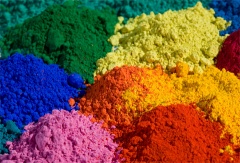Difference between revisions of "Pigments"
| Line 1: | Line 1: | ||
{{Infobox_Other_organic | {{Infobox_Other_organic | ||
| − | | image = | + | | image = Pigments-1.jpg |
| origin = - | | origin = - | ||
| stowage factor = - | | stowage factor = - | ||
| Line 8: | Line 8: | ||
}} | }} | ||
==Description== | ==Description== | ||
| − | Pigments are used for coloring paint, ink, plastic, fabric, cosmetics, food and other materials. Most pigments used in manufacturing and the visual arts are dry colourants, usually ground into a fine powder. This powder is added to a vehicle (or binder), a relatively neutral or colorless material that suspends the pigment and gives the paint its adhesion. | + | Pigments are used for coloring [[paint]], ink, plastic, fabric, cosmetics, food and other materials. Most pigments used in manufacturing and the visual arts are dry colourants, usually ground into a fine powder. This powder is added to a vehicle (or binder), a relatively neutral or colorless material that suspends the pigment and gives the paint its adhesion. |
<br><br> | <br><br> | ||
Certain pigments deteriorate in [[contact]] with air due to moisture being absorbed from the atmosphere. There will be deterioration also if the material becomes wet in any other way. Pigments in paste form should not be allowed to become frozen as this will alter their physical condition. <br><br> | Certain pigments deteriorate in [[contact]] with air due to moisture being absorbed from the atmosphere. There will be deterioration also if the material becomes wet in any other way. Pigments in paste form should not be allowed to become frozen as this will alter their physical condition. <br><br> | ||
Revision as of 13:04, 20 February 2014
| Infobox on Pigments | |
|---|---|
| Example of Pigments |  |
| Facts | |
| Origin | - |
| Stowage factor (in m3/t) | - |
| Humidity / moisture | - |
| Ventilation | - |
| Risk factors | - |
Pigments
Contents
Description
Pigments are used for coloring paint, ink, plastic, fabric, cosmetics, food and other materials. Most pigments used in manufacturing and the visual arts are dry colourants, usually ground into a fine powder. This powder is added to a vehicle (or binder), a relatively neutral or colorless material that suspends the pigment and gives the paint its adhesion.
Certain pigments deteriorate in contact with air due to moisture being absorbed from the atmosphere. There will be deterioration also if the material becomes wet in any other way. Pigments in paste form should not be allowed to become frozen as this will alter their physical condition.
Full information on this product is in the process of completion.











